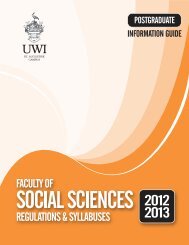Faculty of Humanities and Education (Postgraduate) - The University ...
Faculty of Humanities and Education (Postgraduate) - The University ...
Faculty of Humanities and Education (Postgraduate) - The University ...
Create successful ePaper yourself
Turn your PDF publications into a flip-book with our unique Google optimized e-Paper software.
88<br />
POSTGRADUATE REGULATIONS & SYLLABUSES 2012 - 2013<br />
THE FACULTY OF HUMANITIES & EDUCATION<br />
(Psychology)<br />
Ackerman, P. L., Kyllonen, P. C., & Roberts, R. D. (Eds.). (1998).<br />
Learning <strong>and</strong> individual differences: Process, trait <strong>and</strong> content<br />
determinants. Washington, DC: APA.<br />
Anderson, J. R. (2000). Cognitive psychology <strong>and</strong> its implications<br />
(5 th ed.). New York: Worth Publications.<br />
Eggen, P., & Kauchak, D. (2004). <strong>Education</strong>al psychology: Windows<br />
on classrooms (6th ed.). Upper Saddle Rivers, NJ: Prentice<br />
Hall.<br />
Garbarino, J., Stott, F. M., & <strong>Faculty</strong> <strong>of</strong> the Erikson Institute. (1992).<br />
What children can tell us. San Franscico, CA: Jossey Bass.<br />
Gardner, H. (1991). <strong>The</strong> unschooled mind: How children think <strong>and</strong><br />
how schools should teach. New York: Basic Books.<br />
Linn, R., & Miller, M. (2005). Measurement <strong>and</strong> ASSESSMENT in<br />
teaching (9 th ed.). Upper Saddle River, NJ: Prentice Hall.<br />
Teele, S. (2000). Rainbows <strong>of</strong> intelligence: Exploring how students<br />
learn. Thous<strong>and</strong> Oaks, CA: Corwin Press.<br />
Thomas, R. (2000). Comparing theories <strong>of</strong> child development (5 th<br />
ed.). Pacific Grove, CA: Brooks/Cole Publishing.<br />
YEAR:<br />
SEMESTER:<br />
COURSE CODE: EDRS 6208<br />
COURSE TITLE: FUNDAMENTALS OF EDUCATIONAL<br />
RESEARCH I<br />
NUMBER OF CREDITS: 4<br />
COURSE DESCRIPTION: <strong>The</strong>re are two compulsory courses in<br />
research methodology. <strong>The</strong>se provide a general introduction to<br />
the philosophical foundations <strong>and</strong> methodological strategies <strong>of</strong><br />
research in education. <strong>The</strong>y explore the nature <strong>of</strong> educational<br />
research <strong>and</strong> the origins <strong>and</strong> uses <strong>of</strong> different research<br />
methodologies. Specifically, the courses focus on educational<br />
research informed by the empirical-analytical <strong>and</strong> naturalistic<br />
traditions.<br />
A prominent feature <strong>of</strong> these courses will be small-group,<br />
interactive sessions designed to assist students in the<br />
identification <strong>and</strong> formulation <strong>of</strong> research problems <strong>and</strong> issues.<br />
A guiding principle is that education is an applied discipline <strong>and</strong><br />
that educational research must be driven by a need to improve<br />
education in certain justifiable ways. Thus, the courses will treat<br />
with both the technical side <strong>of</strong> research as well as its ideological<br />
dimensions.<br />
OBJECTIVES<br />
<strong>The</strong> student will be able to:<br />
1. describe the nature <strong>of</strong> educational research;<br />
2. use educational theory in order to select <strong>and</strong> identify<br />
significant research issues;<br />
3. formulate research problems;<br />
4. design appropriate tools <strong>and</strong> instruments for<br />
investigation;<br />
5. use the various statistical forms <strong>of</strong> data analysis;<br />
6. reflect on <strong>and</strong> analyse issues <strong>and</strong> dilemmas in educational<br />
research;<br />
7. develop competence in the interpretation <strong>and</strong> evaluation<br />
<strong>of</strong> educational research findings.<br />
CONTENT<br />
• <strong>The</strong> nature <strong>of</strong> educational research.<strong>Education</strong> as an applied<br />
discipline. <strong>The</strong> relevance <strong>of</strong> educational theory to research<br />
• Sources<strong>of</strong>evidenceinresearch.Identifying<strong>and</strong>formulating<br />
research problems. Selection <strong>of</strong> methods in educational<br />
research<br />
• Research <strong>and</strong> knowledge utilisation<br />
• Reporting <strong>of</strong> educational research<br />
• Designing <strong>and</strong> implementing research in the empiricalanalytical<br />
tradition. Positivist approaches to research:<br />
• the research plan: ethical considerations, sampling<br />
design, data collection<br />
• descriptive research<br />
• experimental research<br />
• descriptive data analysis<br />
measures <strong>of</strong> central tendency<br />
measures <strong>of</strong> variability<br />
measures <strong>of</strong> relationship – correlations<br />
• inferential data analysis testing statistical significance<br />
non-parametric tests<br />
• use <strong>of</strong> computer s<strong>of</strong>tware in data analysis<br />
• preparing a research proposal<br />
ASSESSMENT<br />
This course will be assessed through coursework (40%) <strong>and</strong> a<br />
final examination (60%).<br />
REFERENCES<br />
Best, J., & Khan, J. (1998). Research in education. Boston, MA: Allyn<br />
& Bacon.<br />
Gall, M. D., Borg, W. R., & Gall, J. P. (2003). <strong>Education</strong>al research: An<br />
introduction (7 th ed.). Boston, MA: Allyn & Bacon.<br />
Cohen, L., & Holliday, M. (1984). Statistics for social scientists.<br />
London: Harper <strong>and</strong> Row.<br />
Cohen, L., Manion, L., & Morrison, K. (2000). Research methods in<br />
education (5 th ed.). London: Routledge.<br />
Gorard, S. (2001). Quantitative methods in educational research.<br />
London: Continuum.<br />
Keeves, J., & Lakomski, G. (Eds.). (1999). Issues in educational<br />
research. Amsterdam: Pergamon.<br />
Linn, R. (1990). Quantitative methods. New York: Macmillan.<br />
Pring, R. (2000). Philosophy <strong>of</strong> educational research. London:<br />
Continuum.<br />
Wellington, J. (2000). <strong>Education</strong>al research. London: Continuum.

















